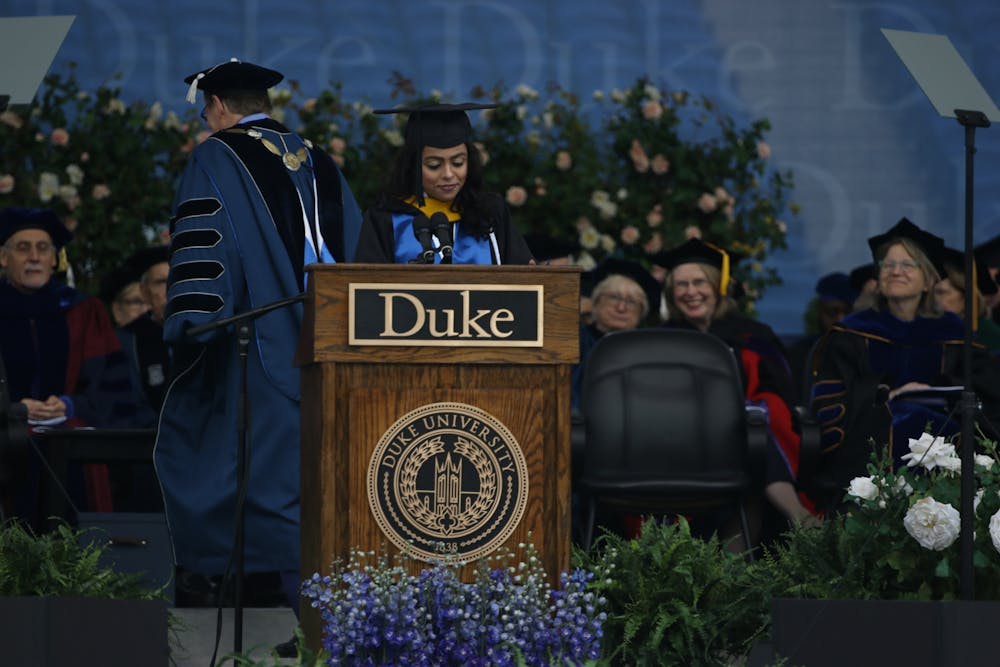A committee of 11 members chose Priya Parkash to give the student Commencement speech after two stages of review, neither of which involved analyzing resemblances with other works, according to a committee member.
The Chronicle reported on Monday that Parkash, Trinity ’22, used language in her Sunday speech that bears striking resemblance to that of Sarah Abushaar’s address at Harvard’s graduation in 2014.
Initially, around 56 graduates applied to be the Class of 2022 student speaker, according to an email obtained by The Chronicle sent from Joanne Dellaero, special assistant to the secretary to the Board of Trustees and chief of staff at Duke University, to committee members in March.
From five finalists, the committee recommended Parkash’s speech to President Vincent Price, according to an email obtained by The Chronicle sent from Lawrence Kluttz, director of communications of the office of the president, to committee members on April 25.
The selection committee was led by Kluttz, according to the committee member, who requested to remain anonymous for fear of retribution.
Committee members included five students, an administrator and staff from the Office of the President, Student Affairs, Office of Special Events and University Ceremonies, Office of Undergraduate Education and Alumni Affairs, according to Kluttz’s April 25 email. Meghana Iragavarapu, last year’s student Commencement speaker, was also a member.
At no point in the selection process were members directed to check for resemblances with other speeches or works, according to the committee member.
“Plagiarism or suspecting plagiarism was never mentioned ... I think there was just an implicit assumption that that wasn’t something we’d have to worry about,” the committee member wrote in a message to The Chronicle.
“To my knowledge, no one ever raised any concerns about [Parkash’s speech],” they added.
Kluttz and Dellaero did not respond to requests for comment in time for publication.
Michael Schoenfeld, vice president for public affairs and government relations, confirmed the number of committee members and their offices.
“Submissions were blinded—that is, the committee was not aware of the identities of the applicants when they reviewed the proposals,” Schoenfeld wrote in an email to The Chronicle.
He declined to “comment further on this year’s process while the investigation is ongoing.”
Parkash submitted a statement to The Chronicle on Tuesday through a crisis public relations firm. In it, she took "full responsibility for this oversight."
"When I was asked to give the commencement speech, I was thrilled by such an honor and I sought advice from respected friends and family about topics I might address. I was embarrassed and confused to find out too late that some of the suggested passages were taken from a recent commencement speech at another university," she wrote.
Initial applications
All seniors were encouraged to apply to give the speech. Interested students had to submit “a brief speech outline of around 250 words” by March 1, according to a February release.
On March 3, the committee was split into two groups, with each group reviewing 28 anonymized outlines, according to an email obtained by The Chronicle sent from Dellaero to committee members.
Each committee member reviewed their assigned 28 proposals and submitted feedback in a Qualtrics form, which The Chronicle obtained. Members were asked to rank each speech proposal from 1 to 100 on metrics of “Interesting Topic,” “Engaging Writing,” “Inclusivity,” “Duke-ness,” and “Celebratory Feel.”
Speaker applicants were not informed of the selection criteria, according to a finalist, who requested to remain anonymous for fear of retribution.
On March 16, Kluttz emailed six members of the Class of 2022 that they had been chosen as finalists and asked them to “submit a draft speech of no more than 1,000 words,” according to an email obtained by The Chronicle sent from Kluttz to the finalist.
Drafts were sent to Kluttz and Dellaero by April 15. Copies of these drafts were not made available to the general committee, according to the committee member.
There was no mention of the Duke Community Standard in Kluttz’s email or at any stage in the selection process, the finalist said.
Finalists then delivered their speech to the selection committee on April 19 in the Breedlove Conference Room in the Rubenstein Library. Between Kluttz’s March 16 email and the April meeting, one finalist dropped out, according to the committee member.
Finalist speech presentations
On April 19, the five finalists delivered their speeches to members of the committee.
The anonymous finalist said that they were not given any information about the members of the selection committee. They were notified through email by Kluttz to enter the room, and once inside, they said they recognized Kluttz, as well as some “fellow students.”
The finalist said that the committee “also recorded on Zoom because they said that they were going to share it with some committee members that were not able to be present.”
Kluttz said to “present [the speech] as if you were speaking on Commencement,” the finalist recalled.
“[Finalists] didn’t overlap, nor did they hear each other’s speeches,” the anonymous committee member wrote in an email to The Chronicle. “In between speeches, the committee talked a little about what we had heard and began to compare them after we’d heard multiple.”
The selection of the final speaker was done using a Qualtrics survey, also obtained by The Chronicle. Committee members were asked to rank each speech on a 100-point scale and leave feedback or comments.
The member wrote in a message that for some speeches, “there were concerns that they were potentially too standard of a Commencement speech—not that they were plagiarized, but that they talked about things that have already been talked about.”
“I think part of the reason [Parkash’s speech] was chosen was because we thought it was more unique,” the committee member wrote.
The committee member added that Parkash’s speech delivered on April 19 was “pretty much the same” as the one she gave during Commencement. They could not recognize any differences.
Selection committee recommends Parkash to President Price
Finalists and committee members heard from Kluttz about results of the selection process on April 25, according to emails obtained by The Chronicle.
According to Kluttz, Parkash’s speech earned a score of 85.62 from committee members, leading “the open-ended scoring by fifteen points.” Parkash was “the first choice of ten of the committee members, and second choice of the others,” Kluttz wrote in an April 25 email to committee members.
He added that he made the recommendation to Price, who then selected her to serve as the student speaker.
Kluttz concluded by thanking the committee members and wrote, “I hope that you feel it was a worthy investment of your time ... I would welcome any feedback on how we can improve the process moving forward.”
The finalist said they were “disappointed” when they learned of the similarities between Parkash’s and Abushaar’s speech.
“I had spent so much time working on my own creative metaphor ... and that effort wasn’t recognized at the expense of something that was copied,” they said.
The finalist added that they would like to see a public response from Duke “because the selection committee is equally at fault for not catching or checking for this.”
They pointed out that the committee had 10 days from April 15, when finalists’ drafts were due, to April 25, when the committee released decisions, where “[committee members] theoretically could have run [speeches] through plagiarism checkers or reviewed them.”
On Tuesday morning, Schoenfeld wrote in a message to The Chronicle that Duke is “aware of and concerned about these allegations and have initiated a process to understand the facts of the situation. Duke expects all students to abide by their commitment to the Duke Community Standard in everything they do as students.”
Get The Chronicle straight to your inbox
Signup for our weekly newsletter. Cancel at any time.

Milla Surjadi is a Trinity junior and a diversity, equity and inclusion coordinator of The Chronicle's 119th volume. She was previously editor-in-chief for Volume 118.

